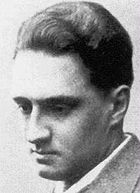
Rudi Stephan
Encyclopedia

Germany
Germany , officially the Federal Republic of Germany , is a federal parliamentary republic in Europe. The country consists of 16 states while the capital and largest city is Berlin. Germany covers an area of 357,021 km2 and has a largely temperate seasonal climate...
composer of great promise who shortly before the First World War was considered one of the leading talents among his generation.
Stephan was a composition pupil of Bernhard Sekles
Bernhard Sekles
Bernhard Sekles was a German composer, conductor, pianist and pedagogue.Bernhard Sekles was born in Frankfurt am Main, the son of Maximilian Seckeles and Anna, . The family name Seckeles was changed by Bernhard Sekles to Sekles. From 1894 to 1895 he was the third Kapellmeister at the Stadttheater...
at the Hoch Conservatory
Hoch Conservatory
Dr. Hoch’s Konservatorium - Musikakademie was founded in Frankfurt am Main on September 22, 1878. Through the generosity of Frankfurter Joseph Hoch, who bequeathed the Conservatory one million German gold marks in his testament, a school for music and the arts was established for all age groups. ...
in Frankfurt
Frankfurt
Frankfurt am Main , commonly known simply as Frankfurt, is the largest city in the German state of Hesse and the fifth-largest city in Germany, with a 2010 population of 688,249. The urban area had an estimated population of 2,300,000 in 2010...
and of Heinrich Schwartz and Rudolf Louis
Rudolf Louis
Rudolf Louis was an influential German music critic and conductor. He was born in Schwetzingen on 30 January 1870. He studied in Geneva, where he was a pupil of Friedrich Klose, and continued his studies in Vienna and then Karlsruhe under Felix Mottl before becoming conductor of the theatre...
in Munich
Munich
Munich The city's motto is "" . Before 2006, it was "Weltstadt mit Herz" . Its native name, , is derived from the Old High German Munichen, meaning "by the monks' place". The city's name derives from the monks of the Benedictine order who founded the city; hence the monk depicted on the city's coat...
, where he settled after completing his studies in 1908. He left only a few works: his liking for pointedly neutral titles along the lines of 'Music for ...' has caused him to be seen as a forerunner of the 'New Objectivity' of the post-war era, but his music is in fact in a hyper-expressive late-Romantic
Romantic music
Romantic music or music in the Romantic Period is a musicological and artistic term referring to a particular period, theory, compositional practice, and canon in Western music history, from 1810 to 1900....
idiom which has more plausibly been seen by some as a kind of proto-Expressionism
Expressionism
Expressionism was a modernist movement, initially in poetry and painting, originating in Germany at the beginning of the 20th century. Its typical trait is to present the world solely from a subjective perspective, distorting it radically for emotional effect in order to evoke moods or ideas...
. His father, a Privy Councillor, was able to finance the performance of his early works, which at first met with incomprehension, but the premiere of his 1912 Music for Orchestra in Worms was a major critical breakthrough. He completed his only opera, Die ersten Menschen, shortly after the outbreak of the war, and it was eventually premiered in Frankfurt five years after his death from a bullet in the brain fired by a Russian sharpshooter, at Chodaczków Wielki near Tarnopol
Ternopil
Ternopil , is a city in western Ukraine, located on the banks of the Seret River. Ternopil is one of the major cities of Western Ukraine and the historical region of Galicia...
on the Galician Front.
His complete orchestral works have been recorded by the Melbourne Symphony Orchestra
Melbourne Symphony Orchestra
The Melbourne Symphony Orchestra is an orchestra based in Melbourne, Australia. It has 100 permanent musicians. Melbourne has the longest continuous history of orchestral music of any Australian city and the MSO is the oldest professional orchestra in Australia...
conducted by Oleg Caetani
Oleg Caetani
Oleg Caetani is a conductor of Ukrainian and Italian descent. He is the son of Igor Markevitch and Donna Topazia Caetani, Markevitch's second wife, who is descended from a Roman family that included the early 14th-century Pope Boniface VIII. Caetani has chosen to use his mother's family name to...
.
List of works
- Opus 1 for Orchestra
- Liebeszauber for baritone and orchestra, after Hebbel (1907, rev. 1911)
- Music for Orchestra [No. 1] (1910)
- Grotesque for violin and piano
- Music for Violin and Orchestra (1910, rev. 1913)
- Music for Seven Stringed Instruments (2 violins, viola, violoncello, doublebass, harp and piano) (1907-11; unfinished revision for piano quintet, 1914)
- Music for Orchestra [No. 2] (1912, rev. 1913) [NB this work is often said to be a revision of the 1910 Music for Orchestra, but they are in fact unrelated]
- Die ersten Menschen (1909-14), opera after the erotic mystery-play by Otto Borngräber

